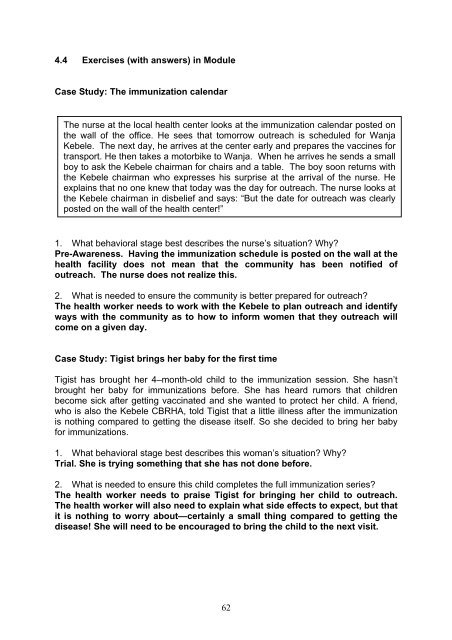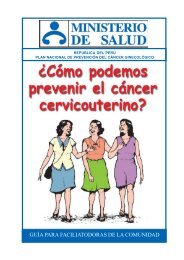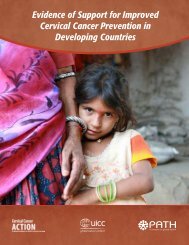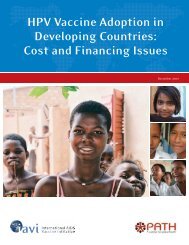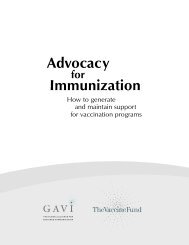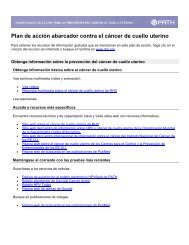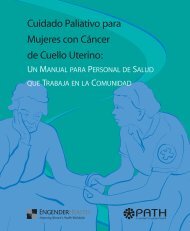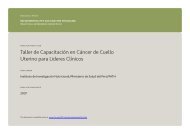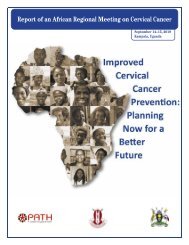Refresher Training for Frontline Health Workers in Expanded ... - RHO
Refresher Training for Frontline Health Workers in Expanded ... - RHO
Refresher Training for Frontline Health Workers in Expanded ... - RHO
Create successful ePaper yourself
Turn your PDF publications into a flip-book with our unique Google optimized e-Paper software.
4.4 Exercises (with answers) <strong>in</strong> Module<br />
Case Study: The immunization calendar<br />
The nurse at the local health center looks at the immunization calendar posted on<br />
the wall of the office. He sees that tomorrow outreach is scheduled <strong>for</strong> Wanja<br />
Kebele. The next day, he arrives at the center early and prepares the vacc<strong>in</strong>es <strong>for</strong><br />
transport. He then takes a motorbike to Wanja. When he arrives he sends a small<br />
boy to ask the Kebele chairman <strong>for</strong> chairs and a table. The boy soon returns with<br />
the Kebele chairman who expresses his surprise at the arrival of the nurse. He<br />
expla<strong>in</strong>s that no one knew that today was the day <strong>for</strong> outreach. The nurse looks at<br />
the Kebele chairman <strong>in</strong> disbelief and says: “But the date <strong>for</strong> outreach was clearly<br />
posted on the wall of the health center!”<br />
1. What behavioral stage best describes the nurse’s situation? Why?<br />
Pre-Awareness. Hav<strong>in</strong>g the immunization schedule is posted on the wall at the<br />
health facility does not mean that the community has been notified of<br />
outreach. The nurse does not realize this.<br />
2. What is needed to ensure the community is better prepared <strong>for</strong> outreach?<br />
The health worker needs to work with the Kebele to plan outreach and identify<br />
ways with the community as to how to <strong>in</strong><strong>for</strong>m women that they outreach will<br />
come on a given day.<br />
Case Study: Tigist br<strong>in</strong>gs her baby <strong>for</strong> the first time<br />
Tigist has brought her 4–month-old child to the immunization session. She hasn’t<br />
brought her baby <strong>for</strong> immunizations be<strong>for</strong>e. She has heard rumors that children<br />
become sick after gett<strong>in</strong>g vacc<strong>in</strong>ated and she wanted to protect her child. A friend,<br />
who is also the Kebele CBRHA, told Tigist that a little illness after the immunization<br />
is noth<strong>in</strong>g compared to gett<strong>in</strong>g the disease itself. So she decided to br<strong>in</strong>g her baby<br />
<strong>for</strong> immunizations.<br />
1. What behavioral stage best describes this woman’s situation? Why?<br />
Trial. She is try<strong>in</strong>g someth<strong>in</strong>g that she has not done be<strong>for</strong>e.<br />
2. What is needed to ensure this child completes the full immunization series?<br />
The health worker needs to praise Tigist <strong>for</strong> br<strong>in</strong>g<strong>in</strong>g her child to outreach.<br />
The health worker will also need to expla<strong>in</strong> what side effects to expect, but that<br />
it is noth<strong>in</strong>g to worry about—certa<strong>in</strong>ly a small th<strong>in</strong>g compared to gett<strong>in</strong>g the<br />
disease! She will need to be encouraged to br<strong>in</strong>g the child to the next visit.<br />
62


